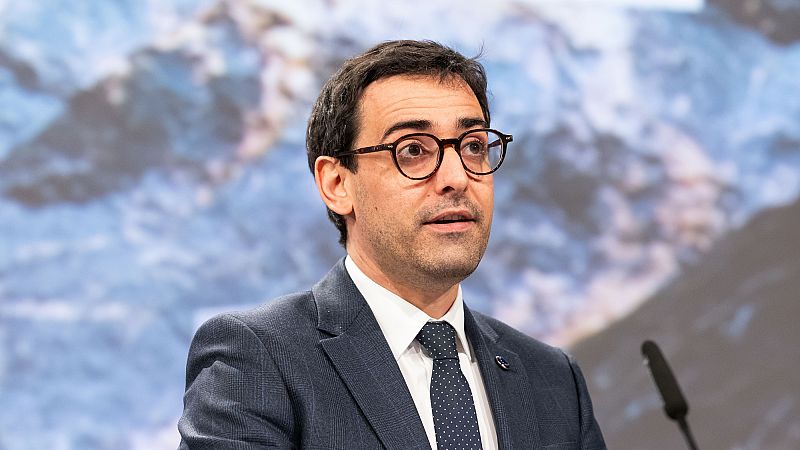
As it accelerates efforts to boost local output amidst growing international competition for crucial materials such as lithium, cobalt, copper, and rare earth minerals, the European Commission has compiled a roster of extraction and refining initiatives aimed at becoming operational by the end of the decade.
We aim to avoid swapping our reliance on fossil fuels for dependency on raw materials," said Vice-President Stéphane Séjourné, who oversees industrial strategy, during a press conference in Brussels today. "Chinese lithium should not become the next version of Russian natural gas.
The French commissioner was referring to how the Kremlin has been using its significant control over much of Europe’s natural gas supply as a strategic tool leading up to Russia’s invasion of Ukraine. Additionally, he highlighted China’s dominant role as the primary source for numerous crucial materials, particularly almost all of the rare-earth elements imported by the European Union.
Lithium—a crucial component in electric vehicle batteries—is among the 34 raw materials the European Union has flagged as essential for shifting away from fossil fuels towards clean energy and the emerging digital economy. The EU considers nearly half of these materials to have particular strategic significance.
The EU list – which can be browsed in interactive map - encompasses industrial initiatives for extracting or processing lithium in Portugal, Spain, France, Germany, Czech Republic, and Finland. In total, these diverse projects span 13 EU member countries.
Lithium and cobalt are set to be on target
Under a Critical Raw Materials Regulation adopted a year ago Governments have pledged to ensure that by the end of the decade, 10% of mineral extraction, 40% of processing, and 25% of recycling activities occur within the European Union.
The Commission stated that the bloc will achieve full compliance with these goals for lithium and cobalt provided that the pertinent projects—chosen based on their readiness and feasibility—are successfully implemented. Additionally, considerable advancement towards meeting objectives for graphite, nickel, and manganese is expected.
The legislation mandates that EU member countries provide expedited permits for chosen initiatives, with a timeframe of 27 months for mining operations and 15 months for processing and recycling plants.
The recently established Critical Raw Materials Board by the Commission will collaborate with the companies concerned to increase the total required capital investment from an estimated €22.5 billion. This can be achieved, for instance, by assisting in funding through development banks.
Last week, the European Investment Bank's board approved a new strategic initiative focused on critical raw materials. This plan will provide up to €2 billion in funding exclusively for investments within this year.
Out of the 170 projects that sought recognition as EU Strategic Projects, 46 originated from countries outside the EU. These applications will undergo additional discussions in the upcoming weeks, with Séjourné acknowledging that these talks will include a significant political element.
The Vice-President of the Commission refuted the notion that the United States' activities, which have shown an interest in crucial raw materials in locations such as Greenland, Ukraine, and even Canada, were the primary catalyst for the European Union's raw materials policy. This policy has been developing momentum over multiple years.
"On the contrary, there might be an element of urgency and haste in commercial dealings and geopolitical strains that wasn’t present three or four months ago, which we should consider," he stated.
Trump takes action
There is evident urgency spreading across the Atlantic. Last Thursday, President Trump issued an executive order titled "Immediate Measures to Boost American Mineral Production." This directive aims to reduce permitting delays and categorizes the issue not only as a defense priority but also as a critical component of energy security.
However, not everyone is satisfied with how quickly Brussels is progressing. Robin Roels, who coordinates the EU Raw Materials Coalition for environmental non-governmental organizations, cautioned that the Commission could erode public confidence via an "opaque" selection procedure.
If the EU genuinely aims for a just and sustainable transformation, it needs to make this process transparent and guarantee that local communities have their say," Roles stated. "Even after numerous requests, the complete roster of project applicants along with the assessment standards continues to be kept secret.
The Commission clearly recognizes that public resistance to mining initiatives—which has hindered attempts to advance lithium extraction in Portugal and Serbia, among others—will have to be addressed for the EU to meet its goals by 2030.
"Manufacturing in Europe will require significant political effort to ensure public acceptance of these initiatives," Séjourné stated, emphasizing the importance of highlighting both national and European interests involved.

Our website uses cookies to improve your experience. Learn more